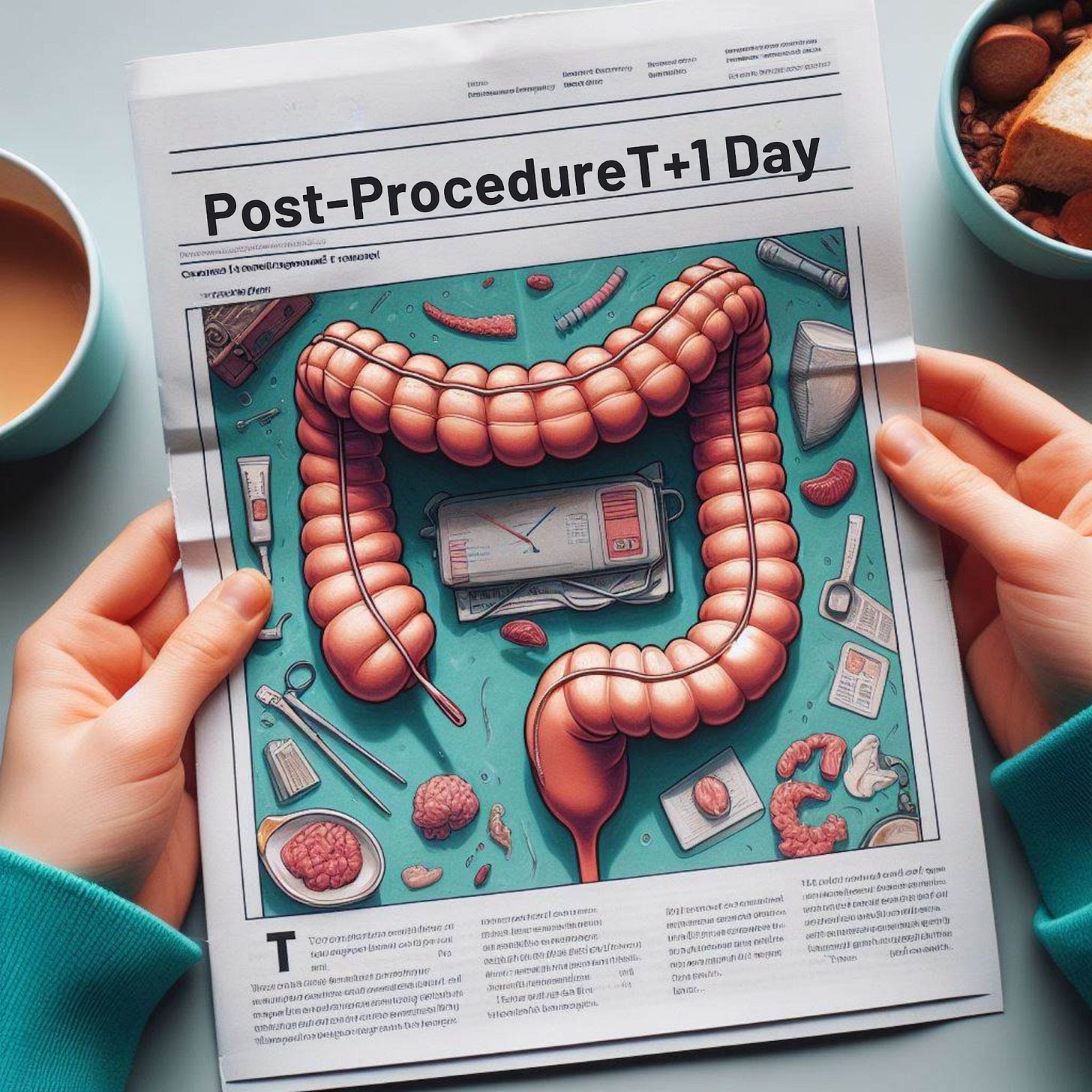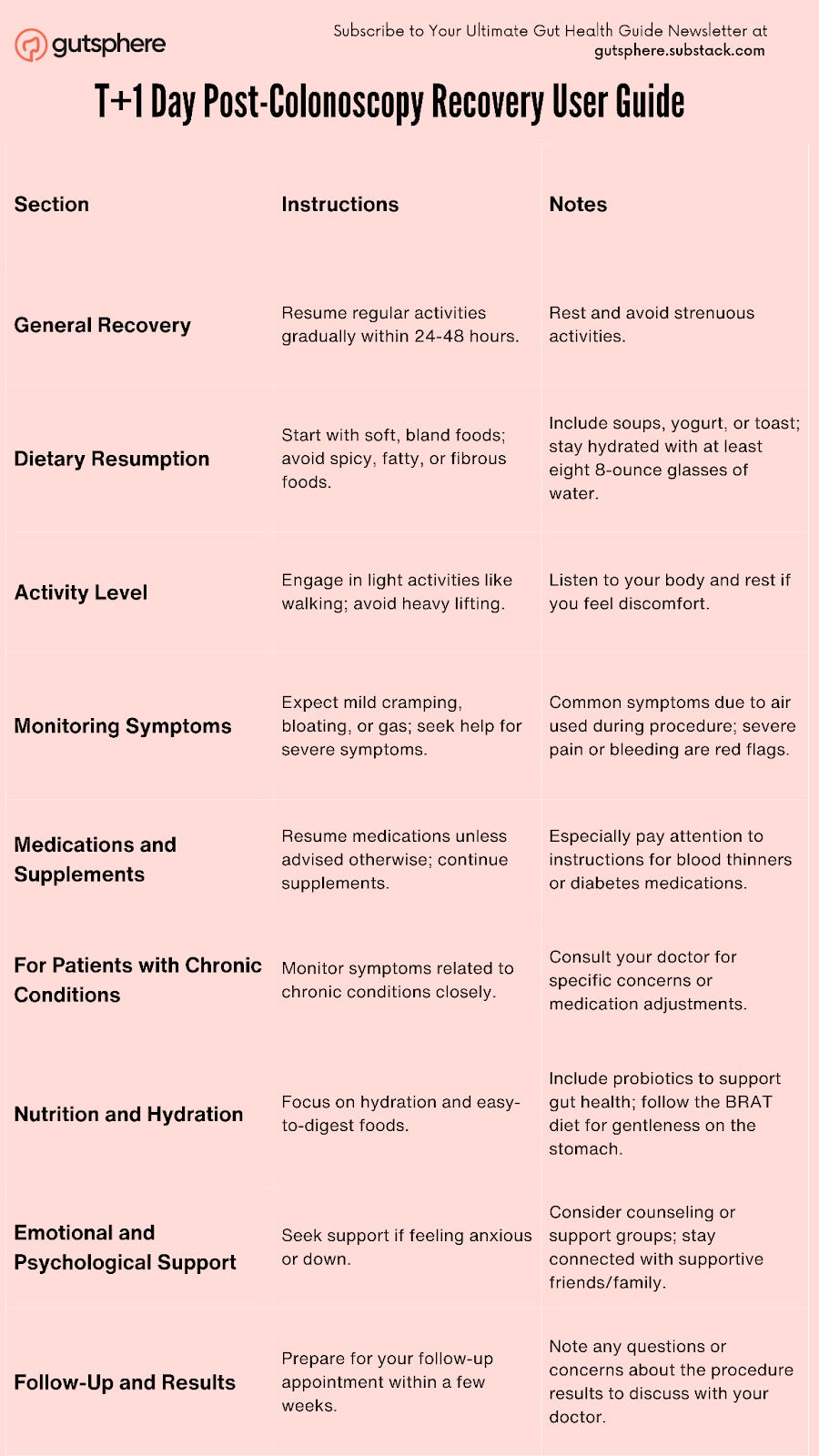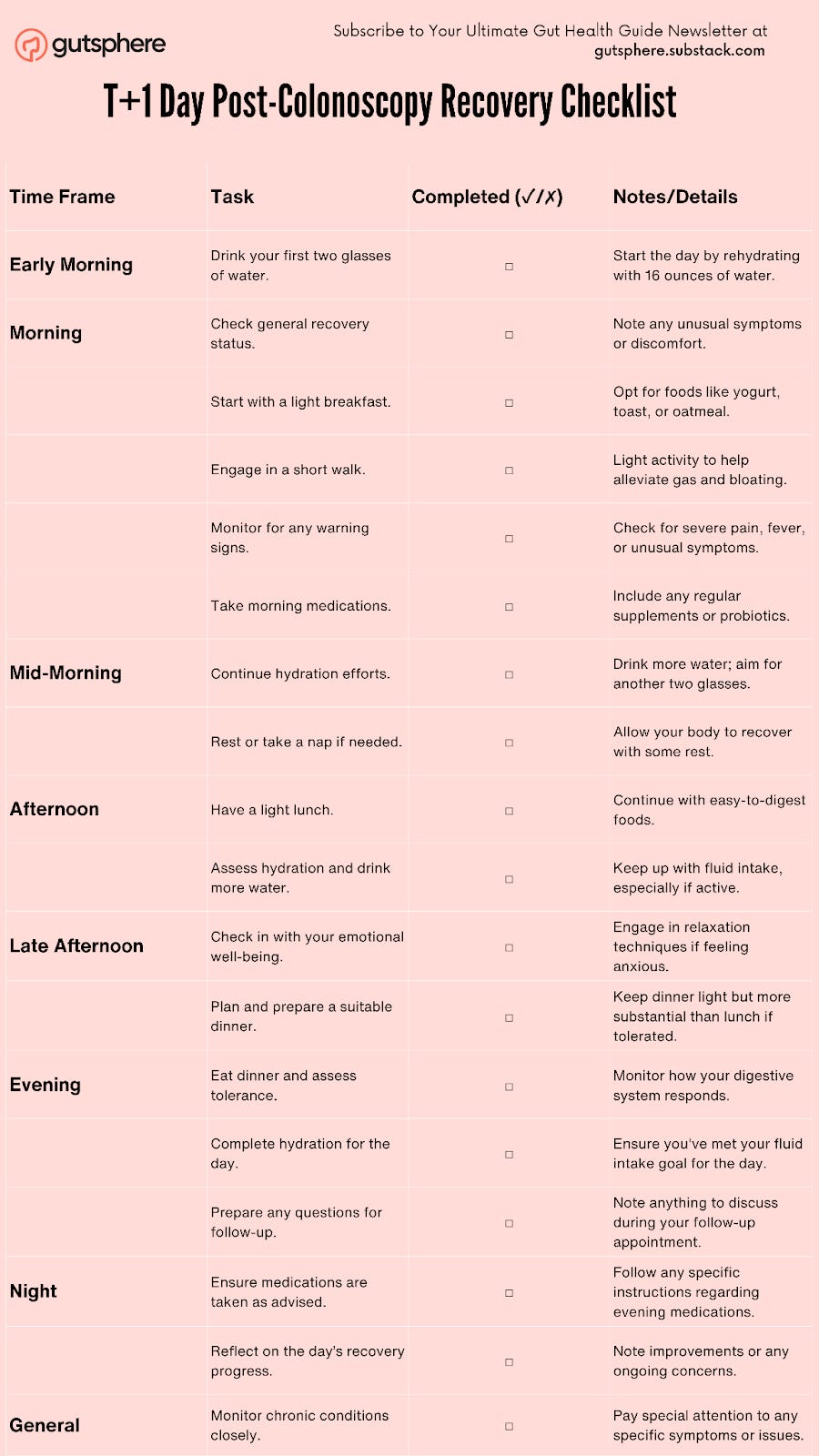Colonoscopy Preparation Timeline Handbook. Episode 12
T+1 Day. Check in.
Introduction
Hello everyone, and welcome back to our Colonoscopy Preparation Podcast series. I'm your host, Bimal Maharjan, and today we're focusing on the T+1 Day post-procedure. You've successfully completed your colonoscopy, and it's time to discuss the crucial first steps in your recovery process. This episode will help you understand what to expect in the next 24 hours and how to manage your recovery smoothly and effectively.
Source of Information:
Our discussion is enriched with insights from leading gastroenterologists and is based on the latest clinical guidelines and research. We blend these expert insights with real-life experiences from patients to offer you a comprehensive view of post-procedure care.
Understanding Recovery and Care:
Today, we will delve into various aspects of the post-colonoscopy recovery phase, such as how to resume your diet, manage physical activities, and monitor for any symptoms that might need medical attention. We'll provide practical advice on what you can do today to ensure a safe and efficient recovery.
Resources and Guides:
Along with our podcast, we provide a detailed user guide and actionable checklists, which are available in the show notes. These resources are designed to assist you in tracking your recovery process and making sure you adhere to the best practices post-procedure.
Specific Focus and Value of Today's Episode:
This episode is particularly crucial as it addresses the immediate post-procedure period—what you can expect on the first day after your colonoscopy, how to manage any discomfort, and tips for reintroducing foods and activities. We aim to help you transition smoothly back to your normal life while taking care of your health.
Stay with us, and by the end of this episode, you’ll have a clear understanding of how to manage your day post-colonoscopy. We are here to support you through this crucial part of your recovery journey, ensuring you have the knowledge and resources to handle this phase with confidence.
Get ready to jot down some key points, as we guide you through the necessary steps to ensure your recovery is as comfortable and effective as possible. Let’s get started and take a closer look at what today holds for your post-procedure care.
General Recovery
Recovery Timeline:
Q1: What is the normal recovery timeline, and when should I expect to return to my regular activities?
Let's start by discussing the general recovery timeline. Typically, the recovery from a colonoscopy is relatively quick. Most people can return to their regular activities within 24 to 48 hours. However, your personal timeline may vary based on factors such as the sedation used during the procedure and your overall health.
Key Point: Recovery generally is quick, allowing for a return to regular activities by the next day.
Supporting Example: Many patients find they are able to go back to work or their normal routine the day after a colonoscopy, assuming no complications arise.
Evidence: Clinical studies indicate that most patients do not require extensive downtime following a colonoscopy, unless directed by a healthcare provider due to specific health concerns or complications.
Diet Resumption:
Q2: Can I immediately return to my regular diet, or are there specific foods I should eat or avoid on the first day after the procedure?
Diet Resumption:
"Moving on to your diet after the procedure, you might wonder if you can eat normally right away. While you can generally start eating more solid foods, it's advisable to start with lighter meals."
Key Point: Begin with easy-to-digest foods.
Supporting Example: Opt for soups, yogurt, or a light sandwich instead of jumping straight into heavy or spicy meals.
Evidence: According to gastroenterological recommendations, reintroducing mild foods initially can help prevent any digestive distress following the procedure, especially since your bowel has been emptied.
Activity Level:
Q3: When can I resume exercise or physical work? Are there any activities I should avoid to prevent complications?
Regarding physical activity, it's important to ease back into any strenuous exercise or heavy work."
Key Point: Gradual resumption of physical activities is advised.
Supporting Example: Start with walking or light stretching on the first day. Avoid activities like heavy lifting or vigorous gym workouts immediately after your procedure.
Evidence: Medical guidelines suggest avoiding strenuous physical activities for at least 24 hours to prevent complications such as bleeding, especially if biopsies were taken during the colonoscopy.
Monitoring Symptoms
Expected Symptoms:
Q4: What are common symptoms I might experience today, and how can I alleviate them?
First, let's talk about what you might feel today. After a colonoscopy, it's common to experience certain mild symptoms as your body recovers from the procedure and the sedation.
Key Point: Common symptoms include bloating, gas, and mild abdominal cramps.
Supporting Example: You might feel gassy or bloated due to the air introduced into your colon during the procedure. This is normal and should subside within a day.
Evidence: Studies indicate that these symptoms are typical post-colonoscopy due to the air inflation of the colon and generally resolve without medical intervention.
Warning Signs:
Q5: what symptoms would indicate a complication from the procedure, prompting me to seek immediate medical attention?
While most symptoms are mild, certain signs should prompt immediate medical attention.
Key Point: Be vigilant for any severe or unusual symptoms.
Supporting Example: If you experience severe abdominal pain, fever, excessive bleeding from the rectum, or signs of an allergic reaction, these could be signs of complications like perforation or infection.
Evidence: Clinical data suggests that such symptoms are rare but require urgent care to prevent serious health outcomes.
Bowel Movements:
Q6: When should I expect my first bowel movement after the procedure, and what should I do if I experience constipation or diarrhea?
Many patients wonder about their first bowel movement post-procedure."
Key Point: Timing of bowel movements can vary.
Supporting Example: You may not have a bowel movement immediately after the procedure, especially since your colon was emptied. It may take a day or two to return to normal.
Advice: If you experience constipation, increase your fluid intake and consider a mild over-the-counter stool softener as recommended by your healthcare provider. For diarrhea, stay hydrated and monitor for signs of dehydration.
Medications and Supplements
Q7: Can I resume all my regular medications and supplements today, or are there exceptions?
Medication Resumption:
"Regarding medications and supplements, the general advice is to resume them as soon as you feel able."
Key Point: Most medications can be resumed immediately.
Supporting Example: Unless your doctor has given specific instructions to delay restarting certain medications, such as blood thinners or diabetes medications, you should be able to take your usual doses.
Evidence: According to post-procedure guidelines, it's important to resume medications to maintain levels of essential drugs in your system, particularly for chronic conditions.
For Patients with Chronic Conditions
Q8: Are there specific symptoms or issues related to my chronic condition (e.g., diabetes, heart disease) that I should monitor more closely after the procedure?
In this segment, we'll discuss the specific considerations for patients with chronic conditions following a colonoscopy.
Key Point: Increased vigilance for specific symptoms is crucial.
Supporting Example: If you have diabetes, monitor your blood sugar levels more frequently as fasting and the procedure may affect glucose control. Heart disease patients should watch for any cardiovascular symptoms like increased heart rate or chest pain.
Evidence: Clinical research emphasizes the importance of closely monitoring chronic conditions after medical procedures to prevent exacerbations.
Medication Adjustments:
Q9: Should I make any adjustments to the medications for my chronic conditions based on my current post-procedure condition?
Adjusting your medications post-procedure may be necessary depending on how you feel and specific instructions from your healthcare provider.
Key Point: Consult your doctor about any needed changes to medication regimens.
Supporting Example: Patients on anticoagulants may need to adjust their dosage temporarily if biopsies were taken, to prevent bleeding complications.
Evidence: Guidelines from the American College of Gastroenterology suggest tailored medication management post-procedure for patients with chronic conditions to ensure safety and efficacy.
Hydration
Q9: How much fluid should I aim to consume today to ensure proper hydration after yesterday’s prep and procedure?
Hydration is a critical component of recovery, especially after the bowel-cleansing process.
Key Point: Aim to consume adequate fluids to restore hydration.
Supporting Example: Drink at least eight 8-ounce glasses of water throughout the day, more if you feel dehydrated or if your doctor recommends increasing fluid intake due to specific health conditions.
Evidence: Research has shown that proper hydration after a colonoscopy can help replenish fluids lost during bowel preparation and support overall recovery.
Nutritional Support
Q10: Are there certain foods or drinks that can help support my recovery and gut health, such as probiotics or specific nutrients?"
Optimizing your diet post-procedure is crucial for speeding recovery and aiding your gut health.
Key Point: Incorporate foods that promote gut healing and reduce inflammation.
Supporting Examples: Foods rich in probiotics like yogurt, kefir, and sauerkraut help replenish healthy gut bacteria. Anti-inflammatory foods such as ginger, turmeric, and omega-3 fatty acids from fish like salmon are also beneficial.
Evidence: Studies have shown that probiotics can accelerate the recovery of the gut microbiome after disturbances like those caused by bowel preparation.
Follow-Up and Results
Q11: When will my follow-up appointment be scheduled, and how will I receive the results of any biopsies or tests performed during the colonoscopy?
Understanding what to expect from follow-up care is key to continuing your health journey post-procedure."
Key Point: Schedule a follow-up appointment to discuss the results and any necessary next steps.
Supporting Examples: This appointment typically occurs a few weeks after the procedure, where your doctor will discuss any findings, such as polyps or biopsies.
Evidence: Follow-up care is crucial, as studies show it enhances patient understanding of their health status and management of any conditions identified.
Q12: Based on the initial feedback from my colonoscopy, are there any immediate next steps or further screenings I should prepare for?
Depending on the findings from your colonoscopy, you may need to take additional steps."
Key Point: Be prepared for further screenings or treatments if recommended by your gastroenterologist.
Supporting Examples: If polyps were removed, your doctor might schedule more frequent screenings. If there were signs of inflammation or other issues, additional diagnostic tests might be recommended.
Evidence: Guidelines from gastroenterological associations suggest that the management of findings like polyps can significantly reduce the risk of colorectal cancer progression.
T+1 Day Post-Colonoscopy Recovery User Guide
Instructions for Use:
Before Starting: Review the guide to familiarize yourself with your post-procedure care.
During Recovery: Follow the steps as outlined to ensure a smooth recovery.
Post-Recovery: Refer back to this guide as needed and prepare for your follow-up appointment.
Printing Instructions:
Format: Print the guide in portrait mode.
Paper Size: Use A4 paper for easy readability.
This user guide is designed to help you efficiently manage your recovery after a colonoscopy, ensuring you understand how to resume daily activities, manage your diet, monitor symptoms, and address any emotional or health concerns.
T+1 Day Post-Colonoscopy Recovery Checklist
Instructions for Use:
Before Starting: Review this checklist the night before or first thing upon waking to ensure clarity on tasks.
During Recovery: Use this checklist as a guide through the day. Check off tasks as completed and note any necessary details.
Post-Recovery: Keep this checklist as a reference to ensure all recommended recovery steps are taken and prepare adequately for follow-up care.
This checklist serves as a practical tool to guide patients through their recovery day, ensuring they manage their health effectively after a colonoscopy and prepare adequately for any follow-up care.
Conclusion
As we wrap up today's episode of the T+1 Day Check-In, I hope you feel well-informed and equipped to handle your recovery with confidence. We've covered a lot today, from how to manage your diet and hydration to understanding what physical activities are safe to resume. We also discussed how to monitor your symptoms for any signs that might require immediate medical attention and how to properly resume your medications and supplements.
Remember, the recovery process is just as crucial as the preparation and the procedure itself. By following the steps outlined in today's guide and checklist, you’re ensuring that your recovery is smooth and that you're taking the best possible care of your health post-colonoscopy. Keep track of how you feel, stay hydrated, and ease back into your normal activities.
Don't forget to utilize the resources we've provided, like the user guide and checklist. These tools are designed to help you navigate this recovery phase effectively. And remember, if you experience any severe symptoms or if anything feels off, don't hesitate to contact your healthcare provider.
Thank you for tuning in, and take heart in knowing that you’re not alone on this journey. We're here to support you through each step of your recovery. Join us in our next episode, where we’ll discuss the follow-up care and the next steps after your colonoscopy. Until then, focus on taking good care of yourself and we wish you a speedy and uneventful recovery. Stay safe, stay informed, and take it one day at a time.
Request
Share
Our sincere request to you is to share the newsletter with your friends, family, and community so that they can benefit from the content. Also it will help us grow the newsletter, and eventually, as we release more content, digital tools, and more we will enable people around the world to live chronic disease free.
Subscribe
Feedback
Also, please give us feedback so that we can improve the content. And if there are any topics that you want us to cover please send us your questions and topics. Furthermore, if you try any of the things we provided information please share your experience with us.
Thank You
GutSphere Team
Disclaimer
Please note that the information provided in this newsletter is for informational purposes only and should not be considered as a substitute for professional medical advice, diagnosis, or treatment. If you have any concerns or questions about our health, please consult with a licensed healthcare professional. The information contained in this newsletter is not intended to diagnose, treat, cure, or prevent any disease. The publisher and authors of this newsletter assume no responsibility for any adverse effects that may result from the use of the information contained herein.
References:
General Recovery
Recovery Timeline: https://www.verywellhealth.com/what-to-do-after-a-colonoscopy-796903
Diet Resumption: https://www.medicalnewstoday.com/articles/what-to-eat-to-prepare-for-a-colonoscopy
Activity Level: https://healthy.kaiserpermanente.org/washington/get-care/additional-services/gastroenterology/colon-prep
Monitoring Symptoms
Expected Symptoms: https://www.verywellhealth.com/how-do-you-know-when-your-bowel-prep-is-complete-797611
Warning Signs: https://my.clevelandclinic.org/health/diagnostics/4949-colonoscopy
Bowel Movements: https://digestivehealthclinic.com/patient-resources/procedure-preparation/how-to-tell-if-your-bowel-is-clean-prior-to-colonoscopy
Medications and Supplements
Medication Resumption: https://www.uclahealth.org/medical-services/gastro/colon-cancer-screening/preparing-colonoscopy/colon-prep-instructions
For Patients with Chronic Conditions
Chronic Condition Management: https://bmjopengastro.bmj.com/content/10/1/e001193
Medication Adjustments: https://bmjopengastro.bmj.com/content/10/1/e001193
Nutrition and Hydration
Hydration: https://www.verywellhealth.com/what-to-do-after-a-colonoscopy-796903
Nutritional Support: https://www.medicalnewstoday.com/articles/what-to-eat-to-prepare-for-a-colonoscopy
Emotional and Psychological Support
Emotional Well-being: https://www.medicalnewstoday.com/articles/what-to-eat-to-prepare-for-a-colonoscopy
Follow-Up and Results
Follow-Up Appointments: https://www.mayoclinic.org/tests-procedures/colonoscopy/about/pac-20393569
Next Steps: https://healthy.kaiserpermanente.org/washington/get-care/additional-services/gastroenterology/colon-prep




